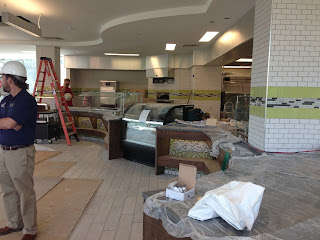Monday:
On Monday we helped Greg who is
going to be the manager for the new Scott hall. We first took temperatures of
all the food at his current dining hall, Snelling dining commons. Taking all these temps helped us with the project
we would be doing for new Scott hall, we are making temperature charts for the
new Scott hall. The temp charts for
Scott hall will be simpler than the temp charts for places like Snelling dining
commons because Scott hall will only be open for lunch and dinner. When making
these charts we have to keep in mind the times that will be best to check the
food, and the order in which the food will be displayed in order to make the
temp taking process fast and efficient for the person who is temping. We also
have to make sure there are places on the charts to temp the coolers under each
station (this will mean checking a hanging thermometer in each section).
Another project we went through
with Gregg that we will be working on for the new Scott Hall is making preparation
diagrams. We will use pictures for each food item they have prepared, when they
made a demo of each, and we will make diagrams off of that to show how to
properly assemble and prepare each food.
The second half of our day was
spent working with Bryan Haymans and Sam at the Village summit dinning commons.
Bryan is the unit manager and Sam is the Chef at village summit. We worked with
them on our menu for the closing banquet for Freshmen College; this is one of
our big projects we will work on all through the summer. Bryan and Sam being well accomplished chefs, with lots of knowledge
to help us with deciding what recipes would work and what to change in each
recipe. Overall they liked our menu choices.
Tuesday
On Tuesday
we worked with Bryan Varin, he is a Chef and associate director for Food services
at UGA to go to a construction meeting for Scott Hall. As they are getting
closer to the date of “soft opening” for Scott Hall, the project is being
looked at with more of a sharp eye. This is the part where they are checking
all the details of how the space is looking, and making sure to stress that now
time is of the essence and if something is found to be incorrect it must be fixed
immediately and they have to go back and check that the correction was completed.
Some of the areas Bryan noticed at Scott hall that needed to be fixed were:
gaping between the equipment and the counter, missing caulking along the time.
This not only made the look unfinished, it also would make for problems with the
tile not holding up properly. Another area that needed to be fixed was the ceiling
tiles. The ceiling tiles in the kitchen need to be the kind that can be
scrubbed, because of the accumulation of grease and food that can happen in any
kitchen. The ceiling tiles was a prime example of an instance when you would
want a manager who has been in food service to overlook the project because they
will know tiles accumulate grease in a kitchen and need to be able to be
scrubbed. The last problem that they found was a large gaping left between the
equipment and the counters. This seems to have been an oversight in measurement
when the counters were put in. They had to come up with a solution there on the
spot with the architect, because they need that to be fixed immediately. These mistakes
are some of the reasons it is crucial to have these meetings in person at the
construction site with the whole team present. This way instead of emailing
back and forth they can point to something immediately and have the problem
solved.
 |
| Gap between equipment and wall |
needs to be caulked
wrong tiles on ceiling
team working together to find a way to fix the gap
We spent the rest of our day
working with Tamala and others in retail. I went to the “dawg bites” eatery
(which is one of their small convenience store locations). I worked with the
very sweet and helpful “Mrs. Pansy” on inventory. After we inventoried
everything in the store and storage with a convenient hand held scanner, I went
to meet about using the “Food Pro” computer system for inventorying. We went
over how they use food pro to type in their inventory, then they can use those
numbers later to check how much they should have in the stores, and how they
are doing with their percent cost for each of the items they sell. Their food
cost is always highest in the 4Th week because that is when they
take inventory (once a month). It is highest that day because they don’t have
all their sales for the week in yet, because they take inventory on a Tuesday.
Wednesday (Trial and Error)
On Wednesday we started our day working with Shelly
Orozco-Marrs, she is the head chef at Bolton Dining commons. Shelly explained to
how they type the menu information into food pro each year. This will tell the
cooks how much food they will need for the recipe for each item in the menu. Then on daily sheets the cooks will write how
much they made of each item and how much was left. Then Shelly will take those
numbers and put them into food pro. Food pro will then adjust and update the
numbers to help them to know how much they will actually serve of an item in
the future. In order to put these numbers
in food pro, Shelly has to find the main ingredient in each food and multiple to
find how many portions were severed, and then she puts that number in food pro.
We then
worked with Bryan Varin. He showed us how to put recipes into their food pro
system. Food pro needs specific measurement amounts. We had to take all our
ingredients and convert them to be in lbs. and oz. However then when food pro
prints a recipe it will put those amounts back into tsp., Tbsp. and cups. Bryan
is also a Chef so he was able to help us make any changes to ingredient amounts.
He taught us what “concasse” meant. It is a culinary term for taking a Roma
tomato cutting an “X” on the bottom , placing it in boiling water (or steaming
it) then you put it in ice water for a few minutes. Next you take the tomatoes
out of the water and peel off the skin. Finally you scoop out the insides seeds
and chop the tomato into chunks.

 |
| Chef Sam and Coll finished Fillet Stuffed Philly Cheese steaks |

 |
| Fillet stuffed Philly Cheese Steak |
 |
| Chef Sam and I working on Chicago's deep dish pizza |
 |
| Finished product to the left fresh Roma tomatoes on the right Canned Roma tomatoes |
Then it
was time to test some of the recipes for on the menu for our banquet. Chef
Shelly and Chef Sam came to the kitchen at Bolton and helped us make two
recipes. We made a Fillet stuffed Philly Cheese steak and a Chicago style deep
dish pizza. The Philly cheese steak as you can see in the pictures below came
out perfectly and was absolutely delicious. We seared the steaks on the grill, and
then we slit the steaks and stuffed them with provolone cheese and sautéed peppers
and onions. Sam made a much demi-glaze port wine reduction mushroom sauce we
put over the fillets then they were finished off in the oven.
We also
made the Chicago deep dish pizza. The pizza was a little tricky we had to make
sure to let the yeast rise the right amount of time at the right temperature.
If you put the dough in at too high of a temperature it will kill the yeast and
the dough will not rise. We made two kinds of pizza one using fresh Roma tomatoes
and one using canned Roma tomatoes. Although one would think that fresh is
always better, in this case we found the opposite to be true. The fresh Roma tomatoes
were too watery; the canned had a hardy taste and complemented the thick deep
dish crust very well. The crust was a little burnt, so we decided we will try
it at a lower temperature next time.
Part of the reasoning the burning happened was because the pans we used
are thinner than pizza pans.
Thursday
On Thursday we went to work at Tate café. This is one of the
food service retail locations in the Tate center. They have two franchise food
establishments. “Barberitos” a Southwestern Grille style restaurant that comes
from Athens. “Larry’s giant subs” This is a franchise out of Jacksonville,
Florida and “Hotei’s” which was a food
service creation, they serve Asian grille style foods. We spent the day with
these managers seeing how operations are run in both the back and the front of
the house. We got to see cash handling and their management style.
We also got to sit
in on job interviews for positions in retail management in food service. We got
to see the kind of questions they asked each applicant, and what each manager
found to be important to them when hiring someone. It was interesting to see
what they reflected on after the interviews each manager seemed to have a
different insight into what they saw as an asset or fault in each applicant.
Friday
On Friday we went to
work Snelling hall where we met with Cindy Malcolm she is a director in
payroll. She explained to us how she does the accounting, payroll approvals and
budgets. Since UGA food service is self-operated and not funded at all by the
University, she explained to us how they have to manage their own funds and
budgets. She said she makes a $0 budget; this means she works at 0 and goes up
creating a budget. She also explained how they put money in reserves each year
to use in case they needed to replace equipment. She said since they are self-operated
they have a budget for each dining commons, but that doesn’t mean anyone would
try to use their whole budget. She also explained for larger projects, such as
building the new Bolton Dining commons
they don’t use reserves, instead they take out a loan with the Universities realtor.
The Weekend!!
Marcus took us to Atlanta to see the Braves game and all of Atlanta:
 |
| Atlanta's Olympic fountain (Atlanta held the '96 Olympics) |
 |
| Coll and I running through the fountain |
 |
| coll running through |
 |
| myself running through |
 |
| CNN center where we ate lunch! |
 |
| Col and I in front of Turner Field |
Marcus and Jeremiah
Atlanta Natives /Braves fans that took us to the game!
FIREWORKS!!! (My favorite!!)
After the game Marcus took us to Stone Mountain to see Fireworks and a laser show against the mountain.








No comments:
Post a Comment